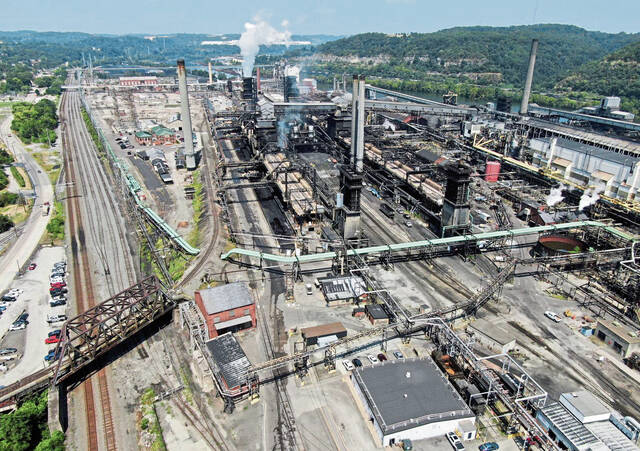An environmental group on Thursday called for stricter pollution monitoring at steelmaking facilities like U.S. Steel’s Clairton Coke Works, a longtime polluter and site of an explosion last week that killed two workers.
A report from the Washington, D.C.-based Environmental Integrity Project documented potentially dangerous levels of pollutants at steel plants in Pennsylvania, Indiana, Alabama, Illinois, Ohio and Michigan.
The report advocated for additional fenceline monitoring along the facilities’ perimeters to track and reduce pollutants. It also raised alarms that President Donald Trump seems to be slow-walking such measures.
“It is clear the steel industry needs common-sense rules to protect the health and safety of workers and the people who live downwind from plants, because of the dangerous chemicals they handle and release,” Jen Duggan, the group’s executive director, said in a statement.
She accused the Trump administration of “bending over backwards” to delay additional monitoring for the steel industry.
Taylor Rogers, a White House spokesperson, defended the administration.
“Pennsylvanians voted for President Trump to unleash America’s energy dominance and restore Pittsburgh’s steel industry — President Trump is committed to delivering on these promises,” according to a statement Rogers provided.
The recent explosion in Clairton, Duggan said, highlighted how dangerous steelmaking can be for workers and the surrounding community.
“The tragic explosion last week at the U.S. Steel Clairton Coke Works facility in Western Pennsylvania that killed two workers and injured at least 10 others makes clear the industry needs more accountability and oversight, not less,” Duggan said during a virtual press conference discussing the report.
U.S. Steel said it appeared the explosion occurred when coke gas from a leaking valve ignited.
Lawsuit filed over delays
The group’s report highlighted harmful pollution from the Clairton Coke Works, where high levels of benzene have been reported.
Benzene is a byproduct of the coke-making process, which heats coal into coke, an important step in steelmaking.
A six-month average concentration of benzene — which can cause blood disorders, harm the immune system and has been linked to leukemia — was eight times higher outside the Clairton plant than a healthy threshold, the report said.
The monitoring sought by the Environmental Integrity Project would require companies to keep tabs on pollutants at various locations around their facilities’ fencelines.
If the samplings show unhealthy concentrations of certain pollutants, the companies would be required to make fixes to reduce emissions.
In 2015, the Environmental Protection Agency began to require such monitoring for benzene at refineries. The program, according to the Environmental Integrity Project’s report, reduced the number of refineries exceeding federal benzene standards by 50%.
That success, the report indicated, pushed former President Joe Biden’s administration to launch similar monitoring measures for other sectors, including some steelmaking facilities.
Under the Trump administration, however, the deadlines to implement such testing are being delayed.
The Environmental Integrity Project filed a lawsuit earlier this month to challenge the delays.
“These kinds of requirements are not new,” Duggan said. “They’ve been proven to be successful for other industries.”
Duggan described the fenceline monitoring as “a check on whether or not the facility is in compliance with the existing laws.”
Andrew Fulton, a U.S. Steel spokesperson, said the rules implemented under the Biden administration last year “were not risk-driven but were developed based on a misinterpretation and application of the Clean Air Act.”
“U.S. Steel supports revisions to regulations that are within the EPA’s statutory authority, based on sound science and are technically feasible,” he said.
Fulton said the existing rules protect human health and the environment, and he said the Gary Works and Mon Valley Works “have achieved a compliance rate exceeding 99%.”
“Environmental stewardship is a core value at U.S. Steel, and we remain committed to the safety of our communities as do our more than 3,000 Mon Valley Works employees, and more than 3,400 Gary Works employees,” Fulton said.
Located in Gary, Indiana, Gary Works is U.S. Steel’s biggest manufacturing plant.
Pushing for protection
The group’s report highlighted concerns with benzene, as well as chromium — a heavy metal known to cause breathing problems, damage to the male reproductive system and ulcers — around steel plants.
“Any company that truly values the well-being of the community it operates in should see this added layer of protection as not just necessary, but the right thing to do,” said Germaine Patterson, a resident who lives near the Clairton Coke Works.
Qiyam Ansari, executive director of Mon Valley-based Valley Clean Air Now, said people living near the plant worry about health effects like asthma and cancer.
“Benzene is not just a number on a chart,” Ansari said. “It is a cancer-causing chemical that families in Clairton breathe every day.”
He urged federal officials to put in place the tools to “force accountability and corrective action,” like additional monitoring.
“Rolling back these protections once again sacrifices Clairton and the Mon Valley to pollution,” Ansari said. “But we will not accept that.”
Steel-producing sites have faced fines for failing to meet the EPA’s standards. U.S. Steel’s Clairton site has faced over $10.6 million in penalties over the last five years. The Edgar Thomson plant in Braddock has received about $1.5 million in penalties over the same time period.
Clairton Coke Works, the largest coke plant in the nation, was one of five such facilities where fenceline benzene monitoring was conducted as part of the process to determine monitoring rules for such facilities.
It had the highest six-month average fenceline concentrations of the five coke plants monitored, according to the report, which collected data from the EPA.
The EPA website lists Clairton Coke Works’ compliance status as “high priority violation.”
“Coke plants and integrated steel mills are significant sources of air pollution, including of hazardous air pollutants,” the report said, urging fenceline monitoring “to help protect the health of workers and nearby communities that are already overburdened with industrial air pollution.”
‘A scary day’
The blast also raised concerns of increased pollutants for people living near the sprawling facility.
Abigail Gardner, a spokeswoman for Allegheny County, said Carnegie Mellon University and the Pennsylvania Department of Environmental Protection deployed additional mobile units to track air quality at the site last Thursday and Friday. Those results are being analyzed, she said.
County monitors never showed pollutants exceeding allowed limits after the incident, officials said.
But the explosion — and the pollution that radiates from the site daily — are still causing concern for residents and advocates like Ansari.
He said he remains concerned about long-term dangers and whether appropriate repairs will be made after the blast. He called for a thorough investigation into the cause of the explosion, something officials have vowed to complete.
Patterson, a lifetime Mon Valley resident who has lived in Clairton for two decades, recalled being home alone with her cat during the Aug. 11 explosion.
Patterson said she ran from room to room before stepping outside and looking around for the cause of the noise, which rattled her home. She discovered it was the nearby coke plant only after seeing others posting about it on Facebook.
“It was a scary day,” she said.
Patterson said residents living near the plant deserve stronger protections from pollutants.
“We definitely need fenceline monitoring. That’s crucial,” she said. “Our lives are worth it.”








